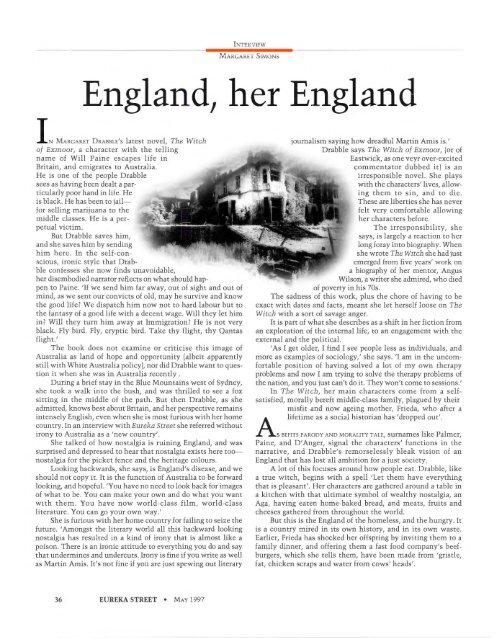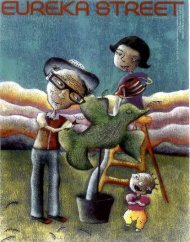n - Eureka Street
n - Eureka Street
n - Eureka Street
You also want an ePaper? Increase the reach of your titles
YUMPU automatically turns print PDFs into web optimized ePapers that Google loves.
INTERVIEWMARGARET SIMONSEngland, her EnglandIN MA>cAm D"'""''s !""'novel, The Witchof Exmoor, a character with the tellingname of Will Paine escapes life inBritain, and emigrates to Australia.He is one of the people Drabblesees as having been dealt a particularlypoor hand in life. Heis black. He has been to jailforselling m arijuana to themiddle classes. He is a perpetualvictim.But Drabble saves him,and she saves him by sendinghim h ere. In the self-conscious,ironic style that Drabbleconfesses she now finds unavoidable,her disembodied narrator refl ects on what should happento Paine. 'If we send him far away, out of sight and out ofmind, as we sent our convicts of old, may he survive and knowthe good life? We dispatch him now not to hard labour but tothe fan tasy of a good life with a decent wage. Will they let himin ? Will they turn him away at Immigration? He is not veryblack. Fly bird. Fly, cryptic bird. Take thy flight, thy Qantasflight.'The book does not examine or criticise this image ofAustralia as land of hope and opportunity (albeit apparentlystill with White Australia policy), nor did Drabble want toquestionit when she was in Australia recently .During a brief stay in the Blue Mountains west of Sydney,she took a walk into the bush, and was thrilled to see a foxsitting in the middle of the path. But then Drabble, as sheadmitted, knows best about Britain, and her perspective remainsintensely English, even when she is most furious with her homecountry. In an interview with <strong>Eureka</strong> <strong>Street</strong> she referred withoutirony to Australia as a 'n ew country'.She talked of how nostalgia is ruining England, and wassurprised and depressed to hear that nostalgia exists here toonostalgiafor the picket fence and the heritage colours.Looking backwards, she says, is England's disease, and weshould not copy it. It is the function of Australia to be forwardlooking, and hopeful. 'You have no need to look back for imagesof what to be. You can make your own and do what you wantwith them. You have now world-class film, world-classliterature. You can go your own way.'She is furious with her home country for failing to seize thefuture. 'Amongst the literary world all this backward lookingnostalgia has resulted in a kind of irony that is almost like apoison. There is an ironic attitude to everything you do and saythat undermines and undercuts. Irony is fine if you write as wellas Martin Amis. It's not fine if you are just spewing out literaryjournalism saying how dreadful Martin Amis is.'Drabble says The Witch of Exmoor, (or ofEastwick, as one veyr over-excitedcommentator dubbed it) is anirresponsible novel. She playswith the characters' lives, allowingthem to sin, and to die.These are liberties she has neverfelt very comfortable allowingher characters before.The irresponsibility, shesays, is largely a reaction to herlong foray into biography. Whenshe wrote The Witch she had justemerged from five years' work ona biography of her mentor, AngusWilson, a writer she admired, who diedof poverty in his 70s.The sadness of this work, plus the chore of having to beexact with dates and facts, meant she let herself loose on TheWitch with a sort of savage anger.It is part of what she describes as a shift in her fiction froman exploration of the internal life, to an engagem ent with theexternal and the political.'As I get older, I find I see people less as individuals, andmore as examples of sociology,' she says. 'I am in the uncomfortableposition of having solved a lot of m y own therapyproblems and now I am trying to solve the therapy problems ofthe nation, and you just can't do it. They won't come to sessions.'In The Witch, h er main characters come from a selfsatisfied,morally bereft middle-class family, plagued by theirmisfit and now ageing mother, Frieda, who after alifetime as a social historian has 'dropped out' .AS BEFITS PARODY AND MORALJTY TALE, surnames like Palmer,Paine, and D' Anger, signal the characters' functions in thenarrative, and Drabble's remorselessly bleak vision of anEngland that has lost all ambition for a just society.A lot of this focuses around how people eat. Drabble, likea true witch, begins with a spell 'Let them have everythingthat is pleasant'. Her characters are gathered around a table ina kitchen with that ultimate symbol of wealthy nostalgia, anAga, having ea ten home-baked bread, and meats, fruits andcheeses gathered from throughout the world.But this is the England of the homeless, and the hungry. Itis a country mired in its own history, and in its own waste.Earlier, Frieda has shocked her offspring by inviting them to afamily dinner, and offering them a fast food company's beefburgers,which sh e tells them, have been made from 'gristle,fat, chicken scraps and water from cows' heads'.36 EUREKA STREET • M AY 1997
















